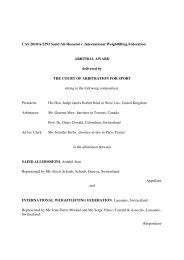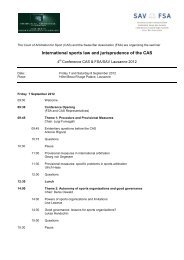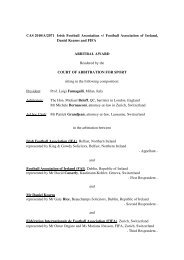(CAS) Bulletin - Tribunal Arbitral du Sport / TAS
(CAS) Bulletin - Tribunal Arbitral du Sport / TAS
(CAS) Bulletin - Tribunal Arbitral du Sport / TAS
Create successful ePaper yourself
Turn your PDF publications into a flip-book with our unique Google optimized e-Paper software.
alternatively, that the name of the witness be<br />
disclosed.<br />
- The RFEC indicated it had no interest in knowing<br />
the identity of such witness. It requested to be<br />
able to put questions to him/her in an effi cient<br />
manner, however preserving his/her identity.<br />
The starting point to determine the applicable law<br />
on matters of evidence is – for all international<br />
arbitrations having their seat in Switzerland – Art.<br />
184.1 of the Private International Law Act (“ PILA ”).<br />
Art. 184.1 of the PILA provides that the Panel “… itself<br />
shall con<strong>du</strong>ct the taking of evidence”. The Panel considers<br />
that in keeping with this provision it is competent<br />
to decide whether or not a given evidence ad<strong>du</strong>ced<br />
by one of the parties is admissible or not (BERGER/<br />
KELLERHALS, International and Domestic Arbitration<br />
in Switzerland, 2nd ed, 2010, no 1205; POUDRET/BES-<br />
SON, Comparative Law on International Arbitration,<br />
2nd ed, 2007, no 643; KAUFMANN-KOHLER-RIGOZZI,<br />
International Commercial Arbitration, 2nd ed, 2010,<br />
no 478).<br />
Inasmuch as the PILA (or the Code) contains a<br />
lacuna regarding the rules on evidence, the Panel has<br />
the powers to fi ll it. This follows from Art. 182.2 of<br />
the PILA, according to which the Panel is entitled to<br />
fi ll a (proce<strong>du</strong>ral) lacuna either “directly or by reference to<br />
a statute or to rules of arbitration”.<br />
However, this power of the arbitral tribunal is not<br />
unlimited as has been expressed by a Panel in another<br />
<strong>CAS</strong> case (<strong>CAS</strong> 2009/A/1879, no. 102):<br />
“ Le pouvoir discretionnaire de la Formation de combler toute<br />
lacune est – en l’absence de règles expresses dans les articles<br />
176 ss LDIP et le Code <strong>TAS</strong> – limité que par l’ordre public<br />
procé<strong>du</strong>ral et les droits procé<strong>du</strong>reaux des parties (Kaufmann-<br />
Kohler/Rigozzi, Arbitrage International, 2006, Rn. 464).<br />
Selon la jurisprudence <strong>du</strong> <strong>Tribunal</strong> Féedéral l’ordre public<br />
procé<strong>du</strong>ral n’est pas facilement violé. Selon le <strong>Tribunal</strong> Fédéral,<br />
l’ordre public procé<strong>du</strong>ral n’est violé que ‚lorsque des principes<br />
fondamentaux et généralement reconnues ont été violés, ce qui<br />
con<strong>du</strong>it à une contradiction insupportable avec les valuers<br />
reconnues dans un Etat de droit ”(TF Bull ASA 2001, 566,<br />
570).<br />
The issue of the anonymous witness is linked to the<br />
right to a fair trial guaranteed under Article 6 of the<br />
Convention for the Protection of Human Rights and<br />
Fundamental Freedoms of the Council of Europe (the<br />
“ ECHR ”), notably the right for a person to examine<br />
or have examined witnesses testifying against him or<br />
her (Article 6.3 ECHR). As provided under Article<br />
6.1 ECHR, this principle applies not only to criminal<br />
proce<strong>du</strong>res but also to civil proce<strong>du</strong>res.<br />
The Panel is of the view that even though it is not<br />
bound directly by the provisions of the ECHR (cf.<br />
Art 1 ECHR), it should nevertheless account for their<br />
content within the framework of proce<strong>du</strong>ral public<br />
policy.<br />
In addition, it is noteworthy that Article 29.2 of the<br />
Swiss Constitution guarantees the same rights, aimed<br />
at enabling a person to verify and discuss the facts<br />
alleged by a witness.<br />
Admitting anonymous witnesses potentially infringes<br />
upon both the right to be heard and the right to a fair<br />
trial of a party, since the personal data and record of<br />
a witness are important elements of information to<br />
have in hand when testing his/her credibility.<br />
Furthermore, it is a right of each party to assist in<br />
the taking of evidence and to be able to ask the<br />
witness questions (KuKo-ZPO/SCHMID, 2011, Art.<br />
155 no. 4; BSK-ZPO/GUYAN, 2010, Art. 155 Rn. 14;<br />
WEIBEL/NÄGELI, in SUTTER-SOMM/HASENBÖHLER/<br />
LEUENBERGER, ZPO, 2011, Art. 155 no 13 and 173<br />
no. 2).<br />
However, not all encroachments on the right to<br />
be heard and to the right to a fair trial amount to<br />
a violation of those principles or of proce<strong>du</strong>ral<br />
public policy. In a decision dated 2 November 2006<br />
(ATF 133 I 33), the Swiss Federal <strong>Tribunal</strong> decided<br />
(in the context of criminal proceedings) that the<br />
admission of anonymous witness statements does not<br />
necessarily violate the right to a fair trial as provided<br />
under Article 6 ECHR.<br />
According to the Swiss Federal <strong>Tribunal</strong>, if the<br />
applicable proce<strong>du</strong>ral code provides for the<br />
possibility to prove facts by witness statements, it<br />
would infringe the principle of the court’s power to<br />
assess the witness statements if a party was prevented<br />
from the outset from relying on anonymous witness<br />
statements. The Swiss Federal <strong>Tribunal</strong> stressed that<br />
the ECHR case law recognises the right of a party<br />
to use anonymous witness statements and to prevent<br />
the other party from cross-examining such witness if<br />
“ l a sauvergarde d’intérêts dignes de protection ”, notably the<br />
personal safety of the witness, requires it.<br />
The Panel considers that these principles apply also<br />
to civil proceedings. The Panel is comforted in its<br />
view by the content of Art. 156 of the Swiss Code of<br />
Civil Proce<strong>du</strong>re (CCP), which provides that a court is<br />
entitled to take all appropriate measures (cf DIKE-<br />
Komm-ZPO/LEU, 2011, Art. 156 no. 12; KuKo-<br />
ZPO/SCHMID, 2011, Art. 156 no. 4; CPC-SCHWEIZER,<br />
Jurisprudence majeure / Leading cases<br />
-<br />
107





